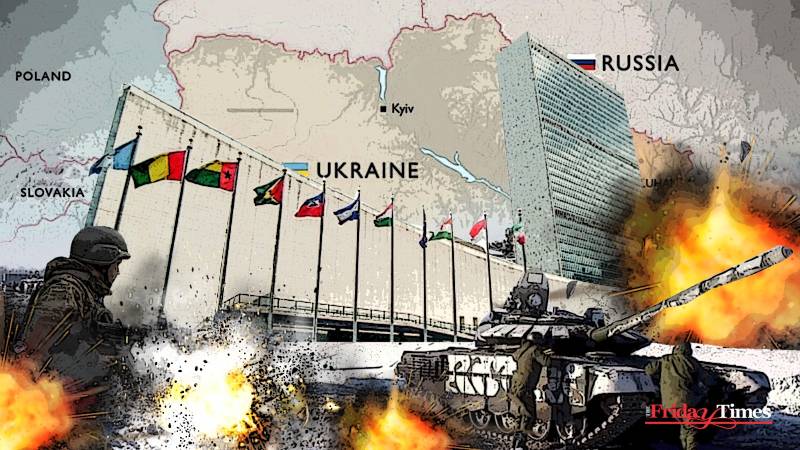
The past few years have caused a major stir in the way the world order is run, with significant armed conflicts jolting the entire scheme.
Starting from the Ukraine war, which is now in its second year, the role of the world peace bodies is most critical and demands significant answers to queries which are well known. As a student of International Law, I am well aware that after the unfortunate Second World War, the United Nations (UN) was created with the sole objective of not letting any similar conflict ever erupt again. The UN charter was carefully drafted with the foremost objective of never allowing any powerful state to bully a weaker state with the broader concept that the world would unite to safeguard the integrity of the oppressed. To elaborate further, Article 2(4) of the UN charter reads “All Members shall refrain in their international relations from the threat or use of force against the territorial integrity or political independence of any state, or in any other manner inconsistent with the Purposes of the United Nations”.
However, subsequent to the creation of the UN, the world has seen numerous armed conflicts where the role of the UN has remained consistently poor in stopping major hostilities, yet both intellectuals and member states have given it the benefit of the doubt by advocating for a concerted effort to strengthen the UN. Most alarmingly, a glitch in the formation of the UN was the allowance of the establishment of five permanent members about whom it was conceived that they hold adequate influence over the geo-political relationships of the world. These states were the United States (US), the United Kingdom (UK), China, France, and Russia. From the Korean War of the 1950s, the Cuban missile crisis, the Vietnam War and the hydrogen/nuclear detonations to the Cold War ending in the late 1980s, the UN saw the world get divided into proxies of the major superpowers with more being done outside the preview of the UN itself.
A major change, however, came with the September 11 attacks, where the UN was at its most vulnerable. As a response to the September 11 attacks, the US found its comfort in the North Atlantic Treaty Organisation (NATO), where the platform of the UN was merely used to rubber stamp resolutions for more war, the most significant being the United Nations Security Council (UNSC) Resolution 1373 of September 28, 2001. The main focus of the paradigm was to strengthen NATO as an alliance between a few states compared to a multi-lateral treaty like the UN, whose platform should have been used for any armed response towards non-state actors. This narrative supports the stance of Article 103 of the UN Charter, which states that “In the event of a conflict between the obligations of the Members of the United Nations under the present Charter and their obligations under any other international agreement, their obligations under the present Charter shall prevail”.
The UN again assembles and does nothing as it involves a permanent member of the UN. In accordance with its past, it is the five permanent members against whose interest the UN cannot pass any resolution, making the five stand against 200 member states
For the next two decades the world saw the UN becoming even more dilapidated as a forum where intellectuals would gather, discuss, teach/preach basic principles of international law with a mere resolve to abide by the ordains of the charter itself. At this junction, it is highly significant to highlight that the world also saw the massacre of the Palestinians in 2008 by the Israelis in which, after the deaths of thousands of innocent Muslims, the UN took 40 days to pass a resolution under Chapter seven of UN charter for the cessation of hostilities. Not to forget that every rule of the UN charter, including the four Geneva Conventions of 1949 and its additional protocols of 1977, which were specifically designed to outline the conduct of the war (Jus-In-Bello) where the conduct of the war (Jus-ad-Bellum) was mercilessly violated.
The Ukraine war, which started in 2022, has seen the sad demise of the UN, which was perfectly in line with the League of Nations (1920-1946). The Russian Federation and Ukraine are engaged in a war where the military might of both sides has been conveniently consumed; the Ukrainian President is regularly meeting the European and American heads of states seeking military assistance and arsenal. The same are being provided and promised accordingly. The UN again assembles and does nothing as it involves a permanent member of the UN. In accordance with its past, it is the five permanent members against whose interest the UN cannot pass any resolution, making the five stand against 200 member states - or pretty much the rest of the world.
The last nail in the coffin was hammered in October 2023 when Israel broke hell upon the Palestinians in violation of every rule of International Law and the law of armed conflicts. The situation has become worse as Israel has resorted to the most prohibited tactics of war, which attract the crimes of genocide, ethnic cleansing and other war crimes, which are considered the most heinous crimes in accordance with the Rome Statute of the International Criminal Court 1998. Hats off to the South Africans who made a very significant case before the International Court of Justice (ICJ), but once again, the ICJ failed miserably to take any substantive action.
Finally, it can be conveniently concluded that the world is now once again at the mercy of the oppressors as before the Second World War. I worry that the above mentioned precedents may be used by other states to carry out armed attacks against their adversaries and in this regard I foresee the subcontinent, the most venerable.

